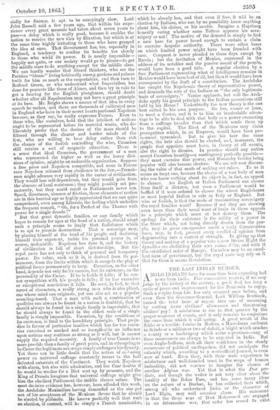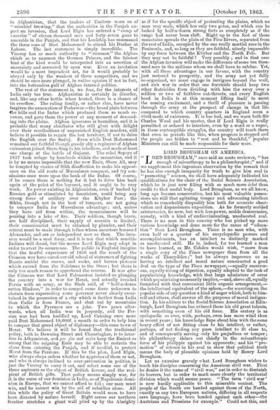TILE LAST INDIAN RUMOUR.
kNGLO.INDIANS have for some time been expecting bad news from India. Five consecutive years is, if we may judge by the history of the century, a great deal too long a cycle of ponce and improvement for the Peninsula to enjoy. Such a respite from fate has only occurred once before, and even then the Governor-General, Lord William Beutinek, turned the brief hour of repose into one of mourning by cutting down civilians' allowances an 1 threatening soldiers' pay ! A misfortune is due in that quarter by the proper sequence of events, and it only remains to conjecture the cause from which it will spring. A. great revolt of the Sikhs or a terrible famine in Madras, a Mussulman outburst in Scinde or a million or two of deficit, a blight which crushes a county - or a bankruptcy which ruins a province—any of these occurrences are always to be expected in India. But even Anglo-Indians, with all their confidence in the steady recurrence of political earthquakes, did not anticipate the calamity which, according to a semi-official journal, is even now at hand. Even they, with their wide experience in misfortune and well-founded trust in the scope of human imbecility, did not venture to imagine the chance of another Afghan war. Yet that is what the Post pre- dicts, and though the writer is not very clear about the locality of the Bolan Pass, and has some funny ideas on the nature of a Durbar, he has collected facts which, among all who understand India or the character of Lord Elgin, may well occasion alarm. His statement is that the three sons of Dost Mahommed arc engaged in an internecine war, that order has ceased to exist in Afghanistan, that the traders of Umitsur warn us of " mischief brewing," that the authorities in the Punjab ex- pect an invasion, that Lord Elgin has ordered a " camp of exercise" of eleven thousand men and forty-seven guns to assemble in the Punjab, and that his Lordship has summoned the three sons of Dost Mahommed to attend his Durbar at Lahore. The last statement is simply incredible. The Viceroy has as much authority to " summon " the Afghan chiefs as to summon the German Princes, and the faintest hint of the kind would be interpreted into an assertion of suzerainty and answered by open war. Even an invitation would be a most imprudent act, for it would probably be obeyed only by the weakest of three competitors, and we should be once more plunged, in native opinion if not in fact, into the bottomless gulf of Afghan internal politics.
The rest of the statement is, we fear, for the interests of India only too true. Afghanistan is certainly in disorder, and, like any other kettle when heated, there is a chance of its overflow. The ruling family, or rather clan, have never forgiven the annexation of Peshawur —the broad plain between the hills and the Indus which produced them so much re- venue, and gave them the power at any moment of descend- ing into the plains. Afghan ignorance is boundless, and it is probable that many chieftains who still gloat with delight over their recollections of unpunished English murders, still believe it possible to regain the lost territory, if not to drive the English over the Sutlej. Even while Bost Mahommed remained our faithful though greedy ally a regiment of Afghan cuirassiers joined Shere Sing in his rebellion, and made at least one charge at the battle of Gujarat. The rebel Sepoys of 1857 took refuge by hundreds within the mountains, and it is by no means impossible that the new Emir, Shere Ali, may be tempted by stories of Sikh disaffection to make his appear- ance on the old route of Mussulman conquest, and try con- ("lesions once more upon the bank of the Indus. Of course, if he comes there is nothing for it but to drive him back again at the point of the bayonet, and it ought to be easy work. No power existing in Afghanistan, even if backed by Russian gold or stimulated by fanaticism, could bring any strong force of artillery over the Khyber Pass ; the Sikhs, though not in the best of tempers, are not going to conquer India for Mussulman advantage ; and, unless they have aid from within, the mountaineers will be pouring into a lake of fire. Their soldiers, though brave, are half disciplined, their supply of recruits is limited, their commissariat must be obtained by plunder, and their retreat must be made through tribes whose ancestors harassed Alexander, and are as independent now as then. The inva- sion would be a mad foray, and it is not that which sensible Indians will dread, but the means Lord Elgin may adopt in order to avert its occurrence. The public in England imagine that the fearful experience of 1836 and the result of the Crimean war have cured our old school of statesmen of fighting Russia amidst the snows, and rocks, and barren plateaus which extend from the Suleiman to the Oxus ; but there is only too much reason to apprehend the reverse. It was after the Crimean war that Lord Palmerston insisted on plunging the country into a war for Herat, and actually invaded Persia with an army, as the Shah said, of " half-a-dozen rotten Hindoos," in order to compel some force unknown to abstain from superseding same governor never clearly ascer- tained in the possession of a city which is further from India than Cadiz is from France, and .shut out by mountains to which the Pyrenees are a joke. Two years after- wards, when all India was in jeopardy, and the Per- sian war had been huddled up, Lord Canning once more paid Dost Mahommed 10,000/. a month in order to help him to conquer that grand object of diplomacy—this same town of Herat. We believe it will be found that the traditional policy, both in Downing Street and Chouringhee, is to inter- fere in Afhganistan, and per .fas aut nefas keep the Emirat so strong that the reigning Emir may be able to restrain the clans from entering the Punjab, and if needful, to protect Herat from. the Persians. If this he the plan, Lord Elgin, who always obeys orders whether he approves of them or not, and who is always inclined to over-precaution in politics, is just the Viceroy to carry it out, and select some one of the three aspirants as the object of British favour, and the reci- pient of British gifts. That policy means simply war, for it is the curse of our dominion in India, as of Napoleonic domi- nion in Europe, that we cannot afford to fail ; our man must win, and he cannot win by the aid of subsidies alone. All this while the policy of Great Britain would seem to have been dictated by nature herself. Right across our northern frontier stretches a giant wall piled up by the Almighty as if for the specific object of protecting the plains, which no man may scale, which has only two gates, and which can be locked by half-a-dozen strong forts as completely as if the range had never been cleft. Right up to the foot of those mountains spreads the plain of the Five Rivers, separated from the rest of India, occupied by the one really martial race in the Peninsula, and, so long as they are faithful, utterly impassable by any force between the Khyber and the North Pole. But they may not be faithful ? Very possibly ; and in that case the Afghan invasion will make the difference of some ten thou- sand men in the millions whom we shall have to subdue. Yet, with all these advantages in our favour, with the country just restored to prosperity, and the army not yet fully re-organized, we must engage in intrigues beyond the wall, and risk war in order that one fratricide should keep two other fratricides from dividing with him the sway over a million or two of faithless cut-throats, and every English head in India is at this moment lifting itself to scent the coming excitement, and a thrill of pleasure is passing through the army at the prospect of change in that life compared to which country quarters in England seem a vivid mode of existence. It is too bad, and we warn both Sir Charles Wood and his master, that if Lord Elgin is really permitted or ordered to interfere, even by a word or a rupee, in these contemptible struggles, the country will teach them that even in periods like this, when progress is stopped and the people are bidden to "rest and be thankful," popular Ministers can still be made responsible for their wars.































 Previous page
Previous page